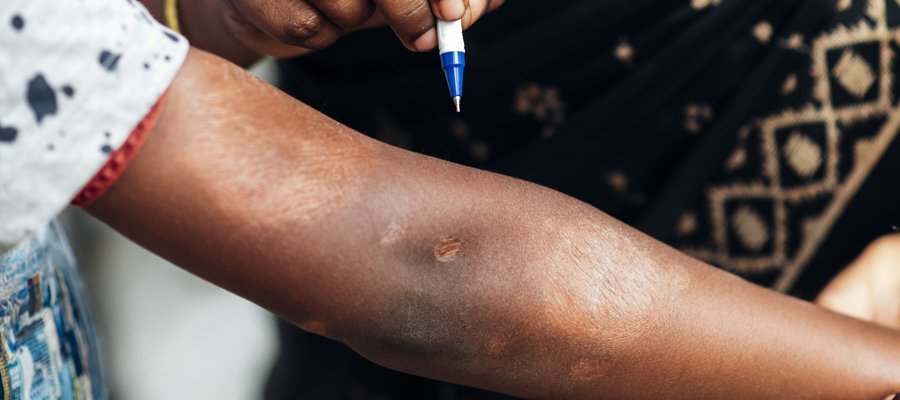What are the symptoms of leprosy?
What are the symptoms of leprosy?

There are several key symptoms of leprosy that you need to be aware of - each of these is explained below. If you notice any of these symptoms, it is important that you tell a health worker because leprosy is curable with free medication. If leprosy is not treated, it can cause serious harm to your body.
The symptoms of leprosy can take a long time to appear after you have been exposed to the disease. It is usually between three and five years, but can be as many as 20 years.
Find out more about how leprosy is transmitted >
Skin patches are a primary sign of leprosy
Patches of your skin that are a different colour to the rest of your body are a key first sign of leprosy. See what leprosy skin patches look like >
Many diseases can cause skin patches, however, only leprosy skin patches lose their feeling. This means, if you were to touch the skin patch, you would not feel anything. You may also find that this part of your skin cannot tell the difference between hot and cold. That means you could be burnt by a hot pot or a fire without it hurting.
Nerve damage
Nerve damage is another sign of leprosy. Nerve damage shows itself in two main ways – loss of sensation and muscles weakness/paralysis. This nerve damage affects the ability to perform everyday tasks.
Damage to Hands
If you lose sensation in your hands, you will not be able to feel if you have hurt your hand. You could burn your hand while touching a hot pan or you could cut or damage your hand doing manual labour, such as using a knife or working in a field or on a building site. If your hands have lost sensation it is important you are careful; although you cannot feel the pain, you can still cause damage that can be very serious.
Hands can also experience muscle weakness. This means you may struggle to make a fist with your hand, or hold a pencil or a cup. You may notice that you cannot stretch your fingers out or hold your hand flat. Instead, your fingers may be clawed inwards.
If you notice that your hands don’t have sensation or are weak – please tell a health worker. Even if you have been treated for leprosy before, if the sensation or strength of your hands changes, please tell a health worker
Damage to Feet
Like hands, feet can experience a loss of feeling. The feet would not be able to feel the heat from a fire or from hot sand if walking barefoot. You would also not be able to feel if there is a stone in your shoe or if you are walking on something sharp. If you have lost feeling in your feet, it is important to check them regularly to see that they are not being damaged, especially if you are walking a lot or spending a long time on your feet.
Feet can also experience muscle weakness. If you are standing and you cannot point your toes towards the sky, this is an indication that leprosy has begun to damage the nerves in your knee. This means that when you lift your foot up to walk, your toes will continue to touch the ground.
If you notice that your feet don’t have sensation or are weak – please tell a health worker. Even if you have been treated for leprosy before, if the sensation or strength of your feet changes, please tell a health worker
Damage to Eyes
A loss of feeling in the eyes can mean that you are not able to feel when your eyes are sore. When there is no sensation around the eyes, many people will stop blinking because they cannot feel that their eyes need the moisture that is provided by blinking. In time, a lack of blinking can cause damage to the lens of your eye, so that it can become like looking through glasses that have been scratched.
Nerve damage can also mean that you are not able to close your eyes properly. If you try to close your eyes you may find that they will not close completely. In some instances, your eyes may not be able to close at all, even when sleeping. Eyelids are designed to protect our eyes and it can lead to serious damage if your eyelids will not close properly. It is possible to receive help when leprosy is damaging your eyes, so it is important that you talk to a doctor about this. Your eyelids also control your tear ducts, so paralysed eye muscles can also cause your eyes to water more than usual so that tears will appear.
If you notice that your eyes don’t close like they did before, or if you notice your eyes are becoming red – please tell a health worker